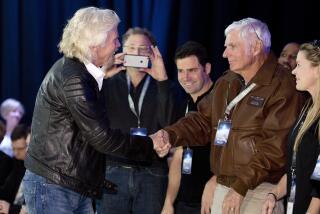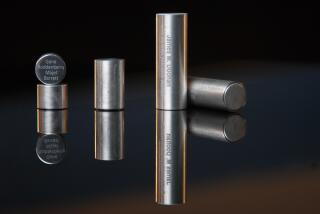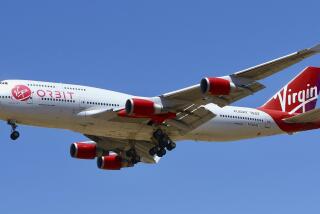Robert A. Citron dies at 79; space visionary
Robert A. Citron, an aerospace engineer and intrepid entrepreneur, whose boyhood fantasy of traveling beyond Earth inspired pioneering ventures to commercialize space, died Jan. 31 at his home in Bellevue, Wash. He was 79.
The cause was complications of prostate cancer, said his son, Kirk.
During an extraordinarily varied career, Citron founded an adventure travel agency, built satellite tracking stations, produced National Geographic documentaries and monitored natural phenomena such as insect invasions and falling meteorites. He even organized a 20-member expedition to watch the Russian space station Mir reenter the Earth’s atmosphere.
FOR THE RECORD:
Robert Citron obituary: The obituary of aerospace entrepreneur Robert A. Citron in the Feb. 8 LATExtra section misspelled the last name of one of his sisters, Cathy Bilovsky, as Bilovkski. —
Among those for whom Citron blazed a trail, Miller said, are entrepreneurs such as Elon Musk of SpaceX and Jeff Bezos of Blue Origin, whose companies are developing technologies they hope will make space travel affordable.
Citron began to focus on space in the early 1980s, “when everybody laughed at him” for advocating space tourism, said his brother, Rick, a Los Angeles attorney.
In 1983 he developed Spacehab, a pressurized module that fit inside the cargo bay of the space shuttle. He had envisioned it for human cargo.
NASA was opposed to carrying people in the module for safety reasons but eventually agreed to another use: Since 1993, Spacehab, which was patented by Citron and co-designer Thomas C. Taylor, has been deployed to hold scientific experiments on more than 20 space shuttle missions, including the 1998 flight of the Discovery, when Sen. John Glenn returned to space.
Citron sold the company in 1986. It is now part of Austin-based Astrotech.
One of Citron’s most important contributions was demonstrating that the private sector could build space hardware far more cheaply than the government. He built two Spacehab modules for $150 million, substantially less than NASA’s estimate of $1.2 billion, said James A. M. Muncy, a space policy consultant in Washington, D.C.
“The power of Bob’s ideas, technical designs and business concepts made space business, including businesses involving humans in space, more real,” Muncy said.
Citron was born Sept. 14, 1932, in Brooklyn, N.Y., and moved to Los Angeles when he was 12. After attending Inglewood High School, he served in the Air Force during the Korean War. He also studied at UCLA and earned degrees in liberal arts from the University of the Philippines and aeronautical engineering from Northrop University in Inglewood.
In 1957, while still at Northrop, he became technical director of the Pacific Rocket Society’s satellite tracking station in Canoga Park. He received a congratulatory call from President Eisenhower when he managed to track Sputnik 1, the Russian artificial satellite, 48 hours after its surprise launch that October, Rick Citron said.
He later built and managed satellite tracking stations for the Smithsonian Astrophysical Observatory in Asia, Africa and Europe.
In 1968, he launched the Smithsonian’s Center for Short-Lived Phenomena in Cambridge, Mass., where he was its director. Using Teletype machines and a network of more than 2,000 correspondents around the globe, he told Popular Mechanics magazine in 1970, he could contact almost any inhabited place in minutes and quickly alert scientists about unusual natural events — earthquakes, fireballs, fish kills and rare animal migrations — as they unfolded.
In 1969, when a friend suggested that they could finance a free trip to view a solar eclipse if they organized a group excursion, he formed Educational Expeditions International, which took scientists and others on such uncommon experiences as climbing into an active volcano. He later sold the company, which is now part of the Boston-based Earthwatch Institute.
While still in high school, he drew up a 39-item bucket list, which included goals such as climbing Mt. Kilimanjaro and dancing with Watusi tribesmen in Africa. Flying into space was the only goal he never achieved, but not for lack of trying. One of his last ventures, in 2005, was a company called Lunar Transportation Systems. Its goal was to create a two-way highway to the moon.
In addition to his son and brother, Citron, who was married three times, is survived by his partner, Audrey Woodin; sons Dave and Josh; daughters Kelly Citron, Gavriella Aber, Leah Richeimer and Dena Samuels; sisters Barbara Namerow and Cathy Bilovkski; 23 grandchildren and a great-grandchild.
More to Read
Start your day right
Sign up for Essential California for the L.A. Times biggest news, features and recommendations in your inbox six days a week.
You may occasionally receive promotional content from the Los Angeles Times.







